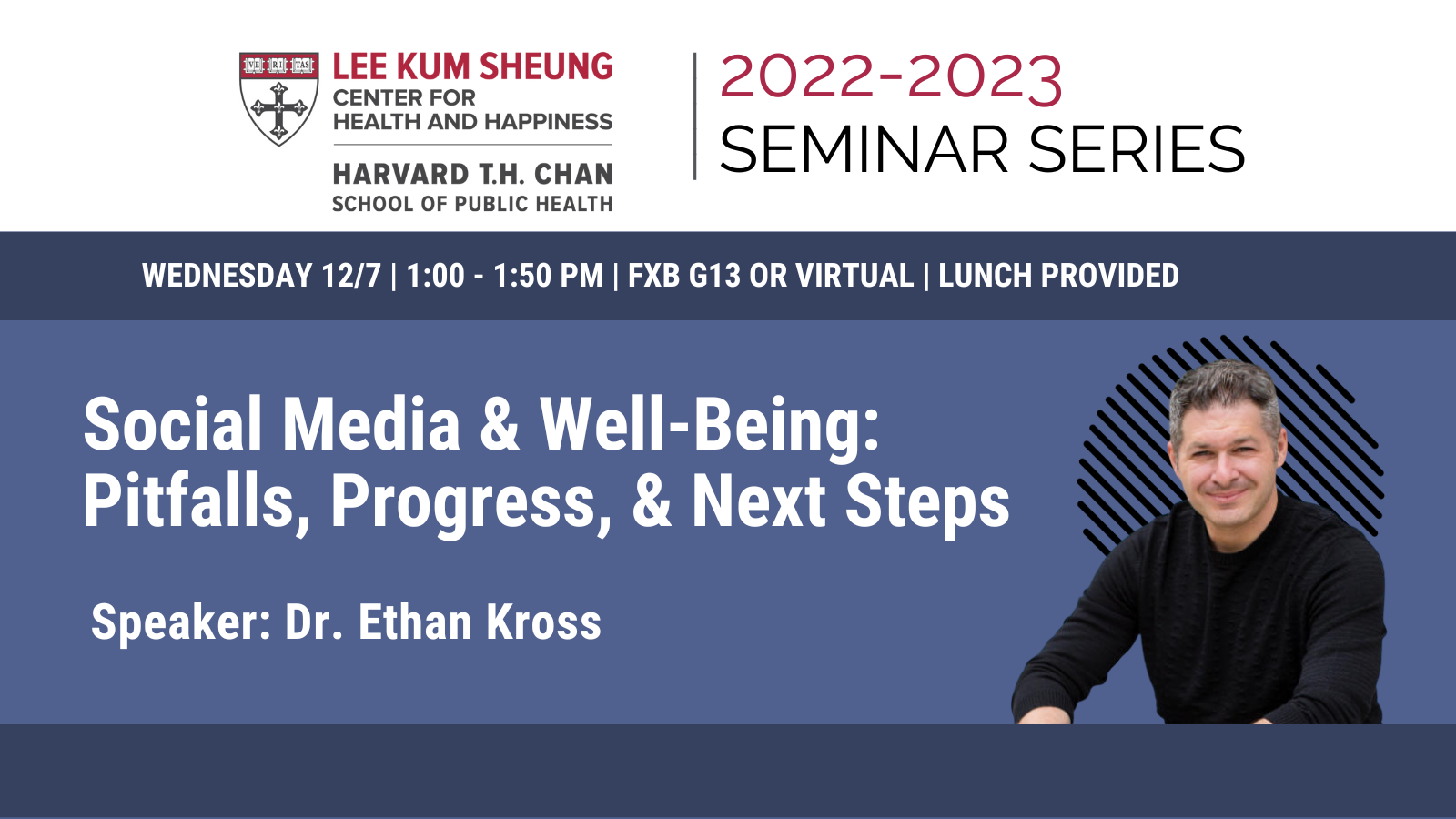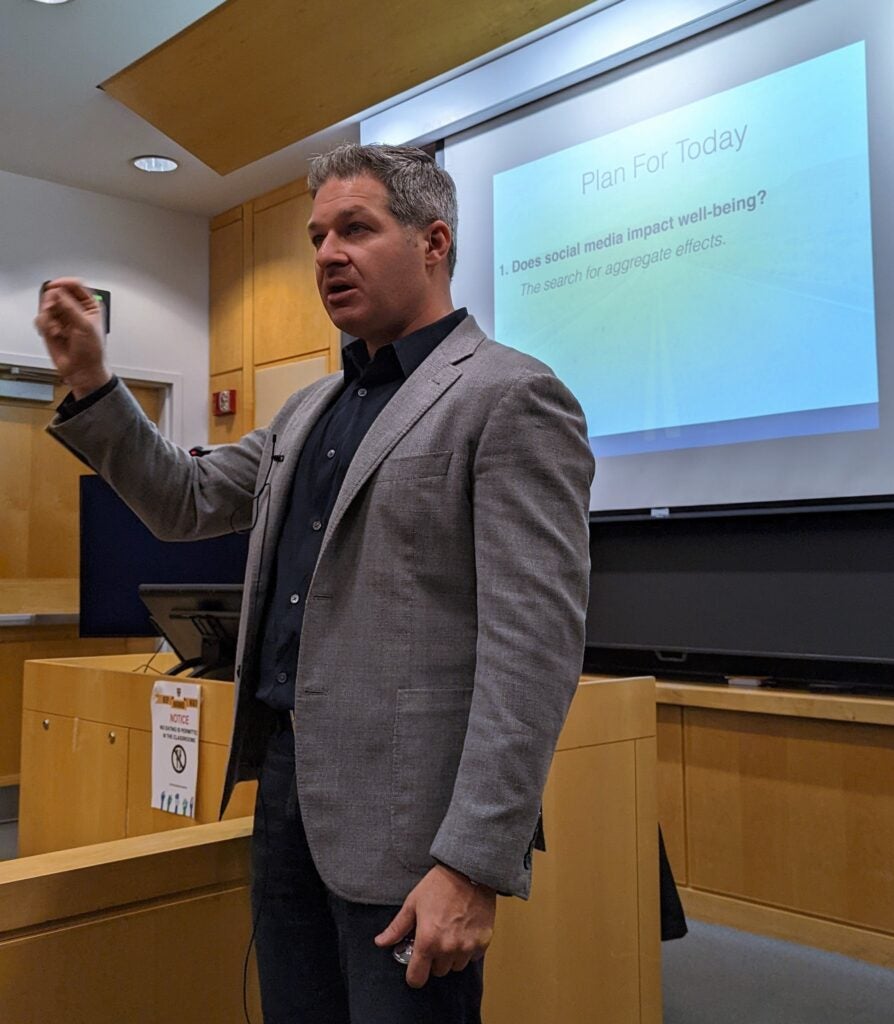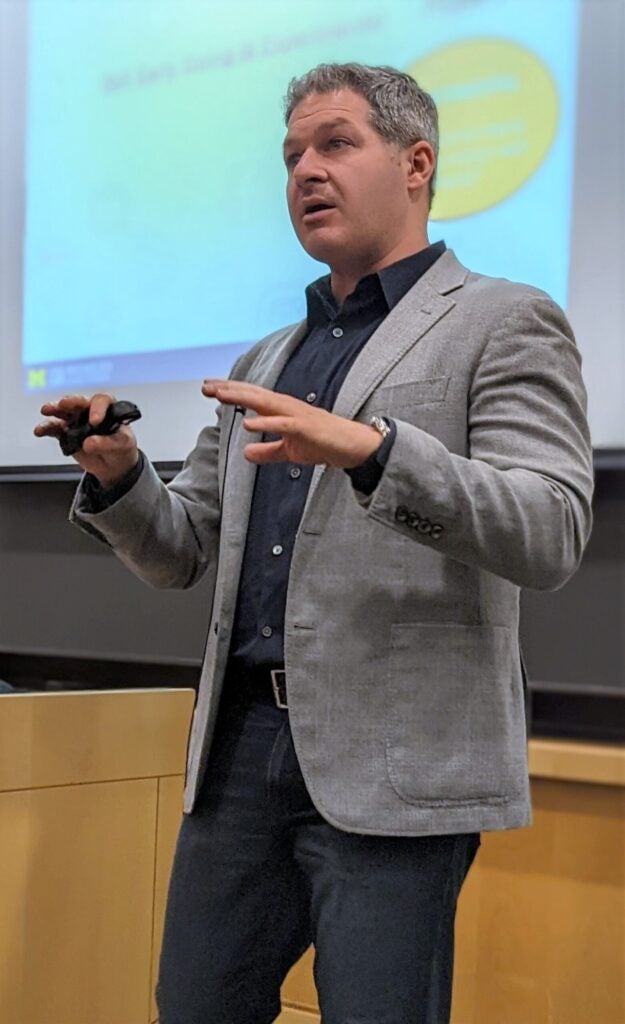Seminar Series: Dr. Ethan Kross

“As Erving Goffman said, ‘Life is a Stage’”, stated Dr. Ethan Kross, commenting on the role of self-presentation in social media. “No one here is in the clothes they went to bed in. That doesn’t make us insecure, that makes us human.” 
Dr. Kross, University of Michigan Professor of Psychology and Management/ Organizations and founding director of the Emotion and Self-Control Laboratory, was visiting the Harvard T.H. Chan School of Public Health to give a seminar on the connection between social media and well-being—a topic he has been studying for nearly two decades. You can watch a recording of the seminar here.
For as long as social media has existed, there has been heated debate on whether its effects are positive or negative. So which is it? Dr. Kross began to answer this question by looking to the past, referencing the creation of the printing press. This single invention changed the way we spread information with other people, and was instrumental in ushering in the scientific revolution. However, it didn’t only have positive ramifications—it also enabled the spread of books such as Hitler’s Mein Kampf, which incited hatred and violence on a shocking scale. The printing press itself wasn’t good or bad—what was significant was how it was used.
“500 years later, we find ourselves living through a time of transformation equally if not more important than the invention of the printing press,” Dr. Kross explained. “We now essentially all have a printing press in our pocket at all times,” allowing us to share our thoughts with friends and strangers alike, instantaneously, all across the globe. Over half the world’s population (4.2 billion people) are currently on social media, and using these networks an average of two hours a day.
There has been extensive research on the correlation between social media and well-being, and the majority of studies have showed small but significant negative effects of social media use on well-being. There is continued debate over the meaningfulness of these effects, as they are small, but can become significant when they add up.
 However, Dr. Kross pointed out that the relationship between social media and well-being is more nuanced than studies suggest. “There’s a lot we can do on social media that can push our emotions in different ways,” he explained. “It is important to remember that social media is simply a new environment to interact in and is neither good nor bad in and of itself”.
However, Dr. Kross pointed out that the relationship between social media and well-being is more nuanced than studies suggest. “There’s a lot we can do on social media that can push our emotions in different ways,” he explained. “It is important to remember that social media is simply a new environment to interact in and is neither good nor bad in and of itself”.
Now that we know that social media does affect well-being, the question shifts to how. One mechanism by which social media affects us is self-presentation. “Humans care immensely how other people perceive them, or how they think they perceive them,” explained Dr. Kross. In real life, there’s only so much we can do to curate our appearance. But online, the possibilities are endless. Our curated online personas can have positive effects on our mood—studies show that viewing one’s own profile enhances self-esteem, and improves ability to manage negative feedback. Social media can also provide unprecedented opportunities to give and receive support. However, looking at the curated online personas of others can have the opposite effect, producing envy and resulting in a decline in well-being. One study showed that about a quarter of the 38,0000 participants from 18 countries said that they compared themselves to others in ways that made them feel bad. A third of that group said they continued to feel negative for 24 hours or more.
Another mechanism by which social media can affect us is the sharing of emotions. When people experience strong emotions, their first impulse is to share them (unless they’re feelings of shame or embarrassment). Sharing helps people satisfy their emotional and cognitive needs. Social media is like a megaphone for sharing these emotions. If we have to wait to talk to someone about our emotions, we usually calm down. But social media allows us to share these emotions immediately, when they’re at their strongest. People are more likely to say something harmful to someone online, when they can’t see their face. This can result in cyberbullying and trolling, the negative outcomes of which are substantial and well-documented. Social media can also facilitate the spread of moral outrage, which contributes to dehumanization and may reduce collective action.
Going forward, Dr. Kross hopes that there will be organized efforts to teach people how to safely navigate social media environments. Rather than simply thrusting children into these environments, parents and educators can teach digital citizenship. Ideally, research and experimentation on more positive ways to interact with social media could be undertaken in collaboration with the social media companies themselves. On an individual level, Dr. Kross recommends that people practice being strategic on social media, only using it in ways that we know improve our well-being, and avoiding aimless scrolling.
Written by Ayla Fudala, Center Communications Coordinator


